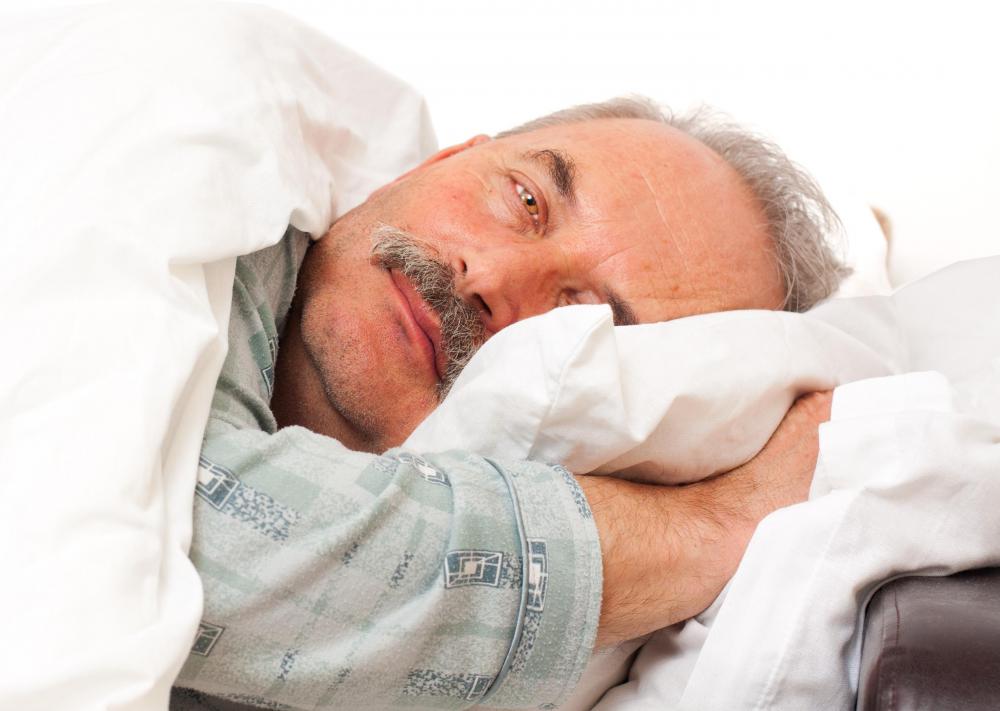At WiseGEEK, we're committed to delivering accurate, trustworthy information. Our expert-authored content is rigorously fact-checked and sourced from credible authorities. Discover how we uphold the highest standards in providing you with reliable knowledge.
What Is Sleep Restriction Therapy?
Sleep restriction therapy is a type of treatment for insomnia. When a person undergoes sleep restriction therapy, he deliberately spends fewer hours in bed in an effort to train himself to sleep longer. The general idea is that restricting sleep consistently for a period of time will help train the body to once more become tired enough to fall asleep and stay asleep for a reasonable number of hours. This type of therapy is also said to help establish improved sleep routines.
A person who tries the therapy usually starts out with sleeping only a few hours each night. For example, a person who tries this therapy may restrict himself to four or five hours of sleep at the start of the therapy. This means a person who has to wake up for work at 6 AM and is restricting himself to five hours of sleep each night would not go to bed until 1 AM. He would keep this up until he was able to sleep for five full hours a night.

Once sleep restriction therapy helps a person to get a full four or five hours of sleep at night, the patient may then aim to increase his sleep time. Often the increase is in 15-minute increments, and the patient doesn't move onto the next 15-minute increase until he is sleeping the entire goal time. Over time, a person who tries this type of sleep therapy may work up to sleeping for at least seven hours each night.

There are certain things a person is not supposed to do while he is undergoing sleep restriction therapy. For example, an individual who is struggling with insomnia is not supposed to lie in bed for long periods of time, hoping to fall asleep. If he hasn't fallen asleep within 20 to 30 minutes of going to bed, he’s supposed to get up and go into another room to do something else for a while. Generally, relaxing activities are suggested rather than activities that might make it harder for the person to fall asleep.

Naps are usually restricted while a person is on sleep restriction therapy. An individual who is not sleeping enough at night is likely to be tired and sluggish during the daylight hours and will want to nap. While napping may seem to be a good idea for catching up on sleep lost at night, it can interfere with the establishment of a normal sleep routine.
AS FEATURED ON:
AS FEATURED ON:
















Discussion Comments
@KoiwiGal - It's not uncommon for people to have two small sleeps rather than one big one. So it's not necessarily excessive sleep or a disorder.
I think sleep restriction therapy for insomnia is more for people who end up waking in the night and can't sleep. I've had insomnia from changing my medication and it is not pleasant at all. You feel half asleep all day and then still can't sleep at night.
@umbra21 - I find that it helps if you recognize what else is effecting your sleep pattern. If I had to undergo sleep restriction therapy, for example, I would play computer games until about an hour before I had to sleep because they keep me wide awake and pass the time quickly.
But playing them right up to the point where I'm supposed to go to bed wouldn't work because it would take me a while to get sleepy. Having a hot bath makes me very sleepy though and so does having a hot drink (although obviously not a caffeinated one).
If you can figure out the things that do this for you, it could help you to establish a better sleeping pattern.
Although if you're really worried, you might want to go and see a specialist.
This is really difficult for me, even though I know it would be good for me. I tend to take a nap during the day, because I work from home. But then I find it very difficult to unwind at night and end up staying up way too late.
And taking a nap during the day isn't always convenient when I have appointments and things like that.
I know I have just gotten into a bad sleeping pattern and if I made sure I restricted my sleep so that I was only sleeping at night I would be able to correct it, but it's really difficult to stop yourself from sleeping when that's what you want to do.
Post your comments